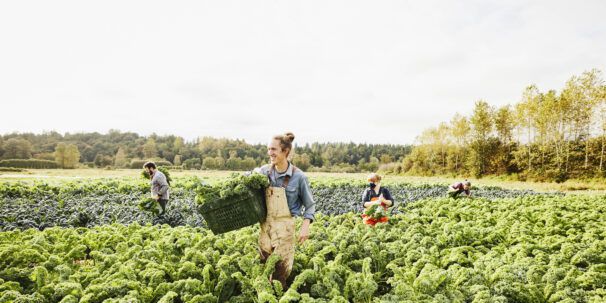
Advancing Farmers’ Rights to a Safe and Healthy Work Environment for Long-Term Agricultural Sustainability
Introduction:
Small farmers play a crucial role in global food production, but they often face hazardous working conditions that pose risks to their health and well-being. Exposure to harmful pesticides, chemicals, and physical hazards in the agricultural sector can have severe consequences for farmers’ long-term sustainability. Ensuring small farmers’ right to a safe and healthy work environment is essential not only for their personal well-being but also for the long-term sustainability of agriculture. This essay explores the importance of protecting small farmers’ rights to safe and healthy working conditions, identifies the challenges they face, and proposes policy measures to address these issues effectively.
Importance of Safe and Healthy Working Conditions:
Small farmers dedicate their lives to feeding communities and contributing to food security. However, their work can be physically demanding and often exposes them to various occupational hazards. Ensuring safe and healthy working conditions for small farmers is crucial for several reasons. Firstly, it protects their physical health and prevents injuries and accidents, reducing healthcare costs and improving overall well-being. Secondly, a safe work environment enhances farmers’ productivity and efficiency, leading to better agricultural outcomes. Additionally, it promotes the longevity and sustainability of small-scale agriculture by enabling farmers to continue their farming activities without risking their health or livelihoods.

Challenges Faced by Small Farmers Regarding Working Conditions:
Small farmers face numerous challenges in ensuring safe and healthy working conditions. One major challenge is exposure to harmful pesticides and chemicals. Pesticides are commonly used in agriculture to protect crops from pests and diseases but can have adverse effects on farmers’ health if not used properly. Lack of knowledge, limited access to protective gear, and inadequate training can increase the risk of pesticide exposure and related health impacts. Moreover, farmers often lack awareness of the potential hazards of certain chemicals and may not have access to safer alternatives.
Physical hazards are another concern for small farmers. Farming involves working with heavy machinery, tools, and livestock, which can result in injuries if proper safety measures are not followed. Additionally, working in extreme weather conditions, such as extreme heat or cold, can pose risks to farmers’ health and well-being.
Furthermore, small farmers often face challenges in accessing healthcare services and occupational safety information. Limited healthcare infrastructure, especially in rural areas, can impede farmers’ access to medical assistance in case of illness or injury. Moreover, the lack of clear occupational safety guidelines and regulations specific to small-scale farming can leave farmers unaware of the necessary precautions to be taken.

Policy Measures to Ensure Safe and Healthy Working Conditions:
To address these challenges, policymakers should implement several policy measures to protect and promote safe and healthy working conditions for small farmers:
- Education and training: Governments should invest in farmer education programs that provide training on safe agricultural practices, proper handling of chemicals, and the use of protective gear. Extension services and agricultural institutions can play a vital role in disseminating information and promoting best practices for farmers.
- Access to protective gear and equipment: Governments should ensure that small farmers have access to affordable and appropriate protective gear, such as gloves, masks, and safety boots. Incentives and subsidies can be provided to promote the adoption of safety equipment.
- Pesticide management and alternatives: Policymakers should promote integrated pest management practices that reduce reliance on chemical pesticides. This includes providing farmers with knowledge and support for using alternatives such as biological control methods, crop rotation, and organic farming techniques. Strict regulations should be in place to ensure the safe handling, storage, and disposal of pesticides.
- Occupational safety regulations: Governments should develop and enforce occupational safety regulations tailored to small-scale farming activities. These regulations should address issues such as machinery safety, livestock handling, and prevention of work-related injuries. Compliance with these regulations should be monitored, and penalties should be imposed for non-compliance.
- Access to healthcare services: Governments should prioritize the establishment and improvement of healthcare infrastructure in rural areas. This includes ensuring the availability of medical facilities, healthcare professionals, and emergency services that cater specifically to the needs of farmers. Mobile clinics or telemedicine services can also be utilized to improve access to healthcare in remote areas.
- Collaboration and knowledge sharing: Stakeholders, including government agencies, NGOs, research institutions, and farmer organizations, should collaborate to share knowledge and experiences on occupational safety in small-scale farming. This can include the development of guidelines, manuals, and training materials that provide practical guidance to farmers.
- Farm inspections and monitoring: Regular inspections of farms should be conducted to ensure compliance with safety regulations. Monitoring systems can be put in place to detect and address occupational hazards promptly. Training programs for inspectors can also be implemented to improve their understanding of small-scale farming dynamics and safety requirements.
- Farmer-led initiatives: Encouraging farmer-led initiatives, such as farmer networks and cooperatives, can promote the sharing of best practices and experiences related to occupational safety. Farmer-led programs can also facilitate peer-to-peer learning and knowledge transfer, empowering farmers to take ownership of their safety.

Conclusion:
Protecting small farmers’ rights to a safe and healthy work environment is crucial for their well-being and long-term sustainability. By implementing comprehensive policies that address the challenges they face and promote occupational safety measures, policymakers can ensure that small farmers can continue to contribute to global food production without compromising their health and livelihoods. It is essential to integrate these policies into broader agricultural development frameworks, fostering a sustainable and resilient future for small-scale agriculture.
All Categories
- Agricultural Methods
- Agriculture and Women Small Farmers Rights Awareness
- Climate Change
- Disable and Human Rights
- Disable Jobs
- Donation
- Education
- Health Issues
- Organic Foods
- Organic Vegetables
- Orphans Children
- Plastic production and disposal
- Services
- Sinking in Scarcity
- Success Stories
- Uncategorized
- Waste Management
- Women Rights
- Youth Empowerment




